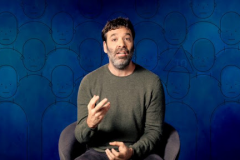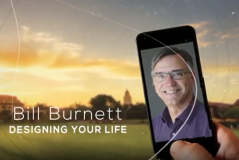Course catalog
Categories
Showing 1-20 of 27 items.
(TED Talk) چگونه گروهها تصمیمات مناسبی اتخاذ میکنند؟
همه ما میدانیم که وقتی تصمیماتی به صورت گروهی میگیریم، همیشه تصمیمی بجا نیست و برخی اوقات ممکن است غلط باشد.
چگونه گروهها میتوانند تصمیمات درست بگیرند؟ به کمک همکارش دن آریلی، ماریانو سیگمان عصب شناس با اجرای آزمایشهایی با مردم در سراسر دنیا به بررسی این موضوع میپردازد که چگونه ما تعامل میکنیم تا به تصمیم برسیم.
در این تجربه مفرح و پر از حقیقت، او برخی از نتایج جالب را درمیان میگذارد و برخی پیامدهای آن را برای چگونگی اثر آن روی سیستم سیاسی ما بیان میکند. در زمانی که مردم به نظر بیشتر از همیشه قطبی شده اند، سیگمان ابراز میدارد، فهم بهتری از چگونگی تعامل و رسیدن به توافق گروهها میتواند جرقهای برای راههای جدید در جهت ساختن دموکراسی سالمتر باشد.
(Ted Talk) راز خوشحالی برای کار بهتر
مشکل اینه که این فرمول به دو دلیل از لحاظ علمی ناقص و خلاف جهت است. اولا” ، هر وقت مغزتان با موفقیتی روبرو می شه، شما قبلش تیر دروازه را عقب تر بردید (شرایط تجلی موفقیت را تغییر داده اید). شما نمره های خوبی گرفتید، حالا نمره های بهتری می خواهید، شما در مدرسۀ خوبی بودید و بعدش پذیرش در مدرسۀ بهتری می خواهید، شما شغل خوبی داشتید ولی حالا می بایست شغل بهتری داشته باشید، شما به هدف زدید، ما نقطۀ هدفتان را تغییر خواهیم داد. و اگر خوشبختی، نقطۀ مخالف موفقیت است، مغز شما هیچگاه به اون نمی رسه. آنچه ما انجام دادیم اینه که در قالب یه جامعه، خوشبختی را به آنسوی افق شناختی سوق دادیم
(TED Talk)پیامد به تعویق انداختن کارها چیست؟
تیم اوربان به خوبی می داند به تعویق انداختن کارها (از زیر کار در رفتن) چه پیامدهایی دارد، اما او هیچوقت نتوانسته عادت لحظه آخری بودنش را ترک کند، در این ارائه جذاب و خنده دار اوربان ما را به دنیای چرخ زدن های چند ساعته و بدون ربط در سایت های مختلف و وقت تلف کردن های طولانی می برد و ما را تشویق می کند که تا قبل از اینکه دیر شود در مورد آن چیزهایی که به تعویق می اندازیم بیشتر فکر کنیم.
5 dangerous things you should let your kids do
At TED U, Gever Tulley, founder of the Tinkering School, spells out 5 dangerous things you should let your kids do -- and why a little danger is good for both kids and grownups.
5 steps to designing the life you want
Designers spend their days dreaming up better products and better worlds, and you can use their thinking to re-envision your own life, says design professor Bill Burnett. He shares five tips to try, whether you're at the start of your career or contemplating your next act.
Bill Burnett is the executive director of the Product Design program and an adjunct professor in Mechanical Engineering Design at Stanford. In addition, Burnett has worked at startups and Fortune 100 companies, including seven years at Apple designing award-winning notebook computers and a number of years in the toy industry designing Star Wars toys.
Agile Programming for you Family
Bruce Feiler has a radical idea: To deal with the stress of modern family life, go agile. Inspired by agile software programming, Feiler introduces family practices which encourage flexibility, bottom-up idea flow, constant feedback and accountability. One surprising feature: Kids pick their own punishments.
Better cybersecurity starts with honesty and accountability
In this practical talk, cybersecurity expert Nadya Bartol brings this crucial topic out into the open, lifting the shame around tech mistakes and offering creative ways to celebrate and reward good cybersecurity habits at work and beyond.
Don't fear super intelligent AI
New tech spawns new anxieties, says scientist and philosopher Grady Booch, but we don't need to be afraid an all-powerful, unfeeling AI. Booch allays our worst (sci-fi induced) fears about superintelligent computers by explaining how we'll teach, not program, them to share our human values. Rather than worry about an unlikely existential threat, he urges us to consider how artificial intelligence will enhance human life.
Everything around you can become a computer
Designer Ivan Poupyrev wants to integrate technology into everyday objects to make them more useful and fun -- like a jacket, you can use to answer phone calls or a houseplant you can play like a keyboard. In a talk and tech demo, he lays out his vision for a physical world that's more deeply connected to the internet and shows how, with a little collaboration, we can get there. Unveiled in this talk: Poupyrev announces that his newest device, Jacquard, is now publicly available for all designers to use.
How AI could become an extension of your mind
Try talking to yourself without opening your mouth, by simply saying words internally. What if you could search the internet like that -- and get an answer back? In the first live public demo of his new technology, TED Fellow Arnav Kapur introduces AlterEgo: a wearable AI device with the potential to let you silently talk to and get information from a computer system, like a voice inside your head. Learn more about how the device works and the far-reaching implications of this new kind of human-computer interaction.
How to speak so that people want to listen
Have you ever felt like you're talking, but nobody is listening? Here's Julian Treasure to help. In this useful talk, the sound expert demonstrates the how-to's of powerful speaking -- from some handy vocal exercises to tips on how to speak with empathy. A talk that might help the world sound more beautiful.
Underwater astonishments
David Gallo shows jaw-dropping footage of amazing sea creatures, including a color-shifting cuttlefish, a perfectly camouflaged octopus, and a Times Square's worth of neon light displays from fish who live in the blackest depths of the ocean. This short talk celebrates the pioneering work of ocean explorers like Edith Widder and Roger Hanlon.
Want to innovate? Become a "now-ist"
"Remember before the internet?" asks Joi Ito. "Remember when people used to try to predict the future?" In this engaging talk, the head of the MIT Media Lab skips the future predictions and instead shares a new approach to creating at the moment: building quickly and improving constantly, without waiting for permission or for proof that you have the right idea. This kind of bottom-up innovation is seen in the most fascinating, futuristic projects emerging today, and it starts, he says, with being open and alert to what's going on around you right now. Don't be a futurist, he suggests: be a now-ist.
Welcome to the age of the industrial internet
Everyone's talking about the "Internet of Things," but what exactly does that mean for our future? In this thoughtful course, economist Marco Annunziata looks at how technology is transforming the industrial sector, creating machines that can see, feel, sense and react so they can be operated far more efficiently. Think: airplane parts that send an alert when they need to be serviced, or wind turbines that communicate with one another to generate more electricity. It's a future with exciting implications for us all.
What adults can learn from kids
Child prodigy Adora Svitak says the world needs "childish" thinking: bold ideas, wild creativity and especially optimism. Kids' big dreams deserve high expectations, she says, starting with grownups' willingness to learn from children as much as to teach.
آموزش پیاده سازی هوش تجاری در اکسل (BI in Excel))
از اکسل 2007 تا اکسل 2016 مایکروسافت همواره در تلاش بوده تا بتواند روش های گزارش دهی را به گونه ای تغییر دهد تا افراد درک بهتری از گزارشات داشته باشند و بتوانند به صورت پویا از گزارشات استفاده نمایند، در آموزش پیش رو شما با ابزارهایی آشنا خواهید شد که با استفاده از آنها سرعت جمع آوری داده و نحوه نمایش آنها به صورت چشمگیری بهبود خواهد یافت، اگر حتی گزارشات بسیار ساده ای در اکسل تهیه می نمایید به شما پیشنهاد می کنیم این دوره آموزشی را از دست ندهید



















